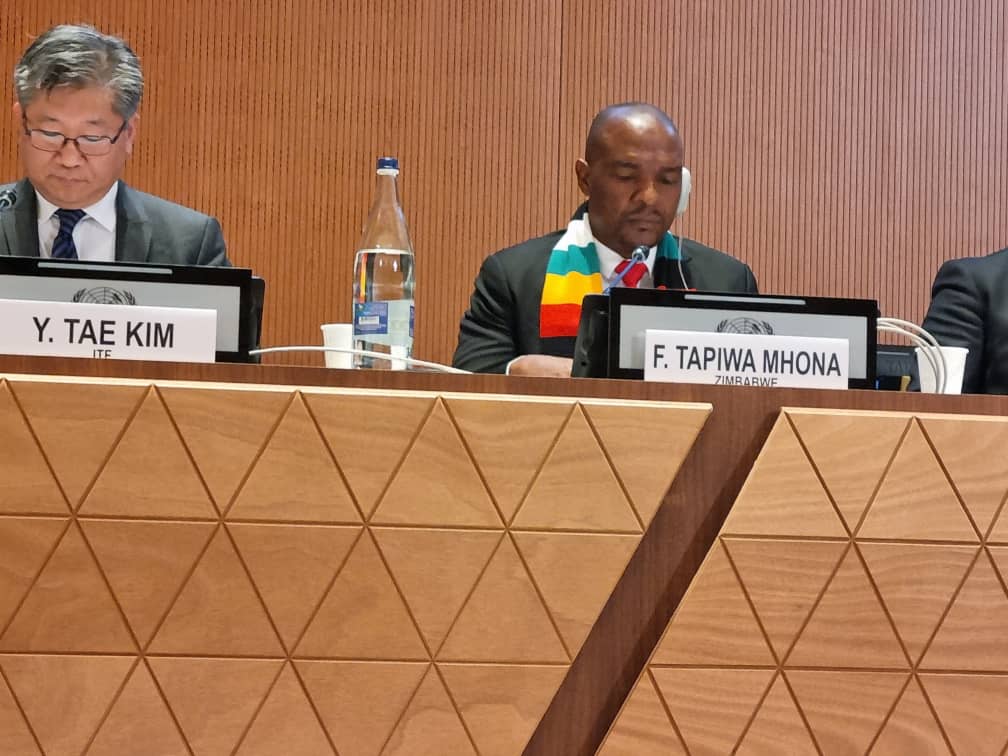|
Getting your Trinity Audio player ready...
|
Zimbabwe is committed to cooperation under the United Nations System, and to the adoption of international good practices and standards on road safety, Hon Felix Mhona, the Minister of Transport and Infrastructure Development has said.
He made the remarks on the occasion of the Inland Transport Committee (ITC) Forum for Road Safety High-Level Event held on 23 February 2023 in Geneva, Switzerland.
The panel discussion was held under the topic: “Capitalizing on success stories and strengthening capabilities among low and middle- income countries in order to achieve their goals under the second Decade of Action”.
The Minister acknowledged the leadership of the ITC in coordinating States toward road safety.
“Your ability to facilitate a conducive environment for reflecting on pressing global road safety issues should be remembered as a hallmark of your leadership thus far.
“I wish to reiterate that Zimbabwe is committed to cooperation under the United Nations System, and to the adoption of international good practices and standards on Road Safety. Indeed, Zimbabwe joins the United Nations family in shaping the attendant discourse, underpinned by the critical question that is among the top policy priorities for governments around the world on how we can turn the second decade of action into a decade of delivery for Road Safety,” Hon Mhona said.
Zimbabwe is one of the many countries that have missed the Sustainable Development Goals target to halve the number of deaths and injuries from road traffic accidents by the year 2020.
The road safety situation according to the minister is more acute in developing countries, and the reasons are manifold. The minister said while counterparts from the developed world have fared comparably well in adopting sustainable measures to reduce the number of global deaths and injuries from road traffic accidents, developing countries remain entangled in the legacies and inequities of the past.
He said the race for economic development, at the backdrop of insufficient road infrastructure development, compounded by a disproportionate vehicle population growth, has created this untenable situation resulting in increased crashes and fatalities.
The Governments of the global south are facing practical challenges in meeting the SDG targets on Road Safety. The devastating effects of Covid-19 have been telling on all sectors of the economies. The diversion of resources meant for developing and modernising transport infrastructure towards supporting basic livelihoods and confronting the pandemic are just some of the direct consequences of the pandemic.
Further, the impact of climate change and variability is becoming more evident, with increased incidences of cyclones and floods which have extensively damaged transport infrastructure and routes. While climate change adaptation, mitigation, and resilience-building have been mainstreamed into Zimbabwe’s national policies, it remains a challenge that needs joint remedial action with the international community.
Hon Mhona said despite the robust engagement and re-engagement efforts by Zimbabwe’s leadership, illegal unilateral coercive measures imposed by some Western countries remain an albatross to efforts towards achieving set road safety targets.
“I, therefore, want to use this platform to rally the international community to encourage countries which have imposed these sanctions on us to lift them, as they are hurting the ordinary people and frustrating our efforts towards meeting, not only the Global Road Safety targets, but also the broader SDGs.”
Zimbabwe recently adopted a seminal economic development blueprint, the National Development Strategy (NDS) 1 (2021-2025). The NDS 1 envisages that by 2025, Zimbabwe should achieve high quality and efficient public transport service, leveraged by a safer, efficient, affordable, accessible, and smart multimodal transportation system, covering both the rural and urban areas, with a view to reducing road accidents and fatalities by a 25% margin per annum. Minister Mhona said ITC deliberations are therefore timely for Zimbabwe to meet the above targets.
The High-Level Meeting has come at a time when the country has undertaken the Zimbabwe Road Safety Performance Review, which produced a report that was launched on 12 January 2022. The review was carried out to assist Zimbabwe’s road safety management capacities and to improve the national road safety record. Hon Mona paid special tribute to the Office of the Special Envoy on Road Safety, Mr. Jean Todt, for their unwavering support throughout the review process.
According to the report, in Zimbabwe, a traffic crash occurs every 15 minutes, over 35,000 crashes occur annually, an average of at least 5 people are killed every day, over 1,800 people die every year and over 10,000 people are injured annually.
As the country moves in to confront the above challenges, there is hope that the recommendations proffered by the experts shall adequately checkmate the deficiencies, with the view to propel structural, institutional, and administrative transformations, leveraged by a robust legislative framework.
As recommendations around the main pillars of road safety management are being implemented, national road safety management systems are being galvanised.
Zimbabwe is currently reviewing its policies and laws with the view to strengthening the Traffic Safety Council of Zimbabwe into a lead Road Traffic Management Agency, with the power to enforce road traffic safety management through coordination and robust regulation of the road traffic actors.
This effort has found profound expression in Zimbabwe’s 2023 budget which speaks volumes of the commitment of the Government at the highest level to mainstream road traffic safety in its programming.
This has given us the impetus to align ourselves with the Sustainable Development Goal (SDG) target 3.6 on halving the number of global deaths and injuries from road traffic crashes; and SDG target 11.2 on providing access to safe, affordable, accessible, and sustainable transport systems as well as improve road safety for all.
The legislative reform is also covering issues related to registration and monitoring of driving schools, the introduction of the penalty point system for drivers who flout road rules, the unveiling of a corporate veil in a manner that will allow owners of public service vehicles who authorize, or turn blind eye to drivers who do not meet the minimum driving pre-requisites for that grade.
Zimbabwe is in the process of acceding to the UN Road Safety Conventions which it is not yet party to. The Ministry of Transport and Infrastructure Development is spearheading a process for their accession and domestication.
The Ministry has targeted to accede to the following Conventions:
- The 1957 Agreement Concerning the International Carriage of Dangerous Goods (ADR);
- The 1958 Agreement concerning the Adoption of Uniform Technical Prescriptions for Wheeled Vehicles, Equipment, and Parts that can be fitted and/or be Used on Wheeled Vehicles and the Conditions for Reciprocal Recognition of Approvals Granted on the Basis of these Prescriptions;
- The 1997 Agreement concerning the Adoption of Uniform Conditions FOR Periodical Inspection of Wheeled Vehicles; and
- The 1998 Agreement concerning the Establishing of Global Technical Regulations for Wheeled Vehicles, Equipment, and Parts that can be fitted and/or be Used on Wheeled Vehicles.






